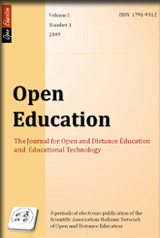Α pedagogical design of a complex instructional intervention with the creation of a hybrid collaborative learning environment
Abstract
creation of a hybrid collaborative learning environment involving distance teaching and
distance collaboration among groups of students. Learning outcomes and processes have been
investigated by qualitative research methods concerning: a) the psychosocial climate of the
class b) the students’ cognitive achievement and c) the participant teachers’ critical reflection
on their own educational experience. The students managed to get introduced normally to the
new learning environment. This was achieved through the implementation of three phases: a)
the virtual class, b) the distance collaboration and c) the distance learning communities and
cooperative teaching. This innovative educational project has been based on a previous
experience we gained as participants in the EU educational program called ‘Odysseus’
(Anastasiades, 2003). However, this particular intervention has been further developed,
especially at the students’ distance collaboration level through the initiation of some more
open, student-centred and complex collaborative investigative learning activities. During this
educational implementation the pedagogical principles of the cognitive and social
constructivism have been adopted, together with some elements of the critical/transformative
approach, while the method of a complex, exploratory project, with the use of ICT in a
collaborative, learning environment (with or without teleconferencing) has been used as a
main instructional approach.
Article Details
- How to Cite
-
Hambiaouris, K., Raptis, A., & Rapti, A. (2009). Α pedagogical design of a complex instructional intervention with the creation of a hybrid collaborative learning environment. Open Education: The Journal for Open and Distance Education and Educational Technology, 5(1), 88–101. https://doi.org/10.12681/jode.9699
- Issue
- Vol. 5 No. 1 (2009)
- Section
- Section 1
Copyright Notice
Authors who publish with this journal agree to the following terms:
Authors retain copyright and grant the journal right of first publication with the work simultaneously licensed under a Creative Commons Attribution Non-Commercial License that allows others to share the work with an acknowledgement of the work's authorship and initial publication in this journal.
Authors are able to enter into separate, additional contractual arrangements for the non-exclusive distribution of the journal's published version of the work (e.g. post it to an institutional repository or publish it in a book), with an acknowledgement of its initial publication in this journal.
Authors are permitted and encouraged to post their work online (preferably in institutional repositories or on their website) prior to and during the submission process, as it can lead to productive exchanges, as well as earlier and greater citation of published work.



